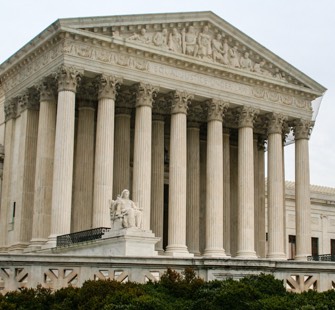SCOTUS takes IPR constitutionality challenge in Oil States
 To the surprise of many, the United States Supreme Court has granted certiorari in Oil States vs. Greene’s Energy Group, et al. From a substantive standpoint, this dispute is between the parties to an inter partes review (IPR) proceeding conducted by the Patent Trial and Appeal Board (PTAB). By taking this case, the Supreme Court will address the constitutionality of having an Article I tribunal extinguish patent rights under the post grant proceedings created by the America Invents Act (AIA).
To the surprise of many, the United States Supreme Court has granted certiorari in Oil States vs. Greene’s Energy Group, et al. From a substantive standpoint, this dispute is between the parties to an inter partes review (IPR) proceeding conducted by the Patent Trial and Appeal Board (PTAB). By taking this case, the Supreme Court will address the constitutionality of having an Article I tribunal extinguish patent rights under the post grant proceedings created by the America Invents Act (AIA).
The Supreme Court granted certiorari only on the first question presented: “Whether inter partes review – an adversarial process used by the Patent and Trademark Office (PTO) to analyze the validity of existing patents – violates the Constitution by extinguishing private property rights through a non-Article III forum without a jury.”
The grant of certiorari in this case is particularly noteworthy given that the United States was asked by the Supreme Court for its views and opined in its brief that the petition should be denied.
The argument that inter partes review is unconstitutional can be traced back all the way to 1898 when the Supreme Court issued its decision in McCormick Harvesting Mach. Co. v. Aultman & Co., 169 U.S. 606 (1898). In that case, the Supreme Court held that once a patent is granted, it “is not subject to be revoked or canceled by the president, or any other officer of the Government” because “[i]t has become the property of the patentee, and as such is entitled to the same legal protection as other property.”
The phrasing of the question taken by the Supreme Court could be quite telling. Over the last several years, 8 of the 9 Supreme Court Justices have signed on to an opinion that has recognized that a patent confers either an exclusive or valuable property right. Thus, it would hardly seem a stretch to suggest that the Court, or at least the required four Justices necessary to take a case, have some reason to suspect that the extinguishing of a exclusive, valuable property through a non-Article III forum without a jury violates the Constitution.
While many will undoubtedly have varied opinions as to the importance of this decision by the Court to take this case, the truth is that any decision by the Supreme Court in Oil States simply cannot make things any worse for patent owners. The PTO already considers patents to be a public right, and post grant challenges, particularly inter partes review and covered business method review, are killing patent claims at exceptionally high rates.
This case will be argued during the October 2017 term, with a decision by the end of June 2018. In the coming months there will be much more analysis as the party briefs and amici are filed. Stay tuned.
For instant industry reaction please see: Industry Reaction to SCOTUS Granting Cert. in Oil States.
USPTO undertakes review of PTAB, IPR proceedings
 The United States Patent and Trademark Office (USPTO) recently announced that, at the direction of USPTO Director Michelle Lee (shown left), the Office is launching an initiative “to further shape and improve Patent Trial and Appeal Board (PTAB) trial proceedings, particularly inter partes review proceedings.” According to the USPTO, the purpose of the initiative is to ensure that post grant proceedings are both effective and as fair as possible.
The United States Patent and Trademark Office (USPTO) recently announced that, at the direction of USPTO Director Michelle Lee (shown left), the Office is launching an initiative “to further shape and improve Patent Trial and Appeal Board (PTAB) trial proceedings, particularly inter partes review proceedings.” According to the USPTO, the purpose of the initiative is to ensure that post grant proceedings are both effective and as fair as possible.
The timing of the announcement is curious given that Michelle Lee’s days may be numbered as Director of the Office. As first reported on IPWatchdog.com, Commerce Secretary Wilbur Ross has interviewed at least three candidates for the position of Under Secretary of Commerce for Intellectual Property and Director of the United States Patent and Trademark Office: Phil Johnson, former Vice-President for Intellectual Property Strategy & Policy for Johnson & Johnson; Randall Rader, former Chief Judge of the United States Court of Appeals for the Federal Circuit; and an unidentified patent attorney characterized by one source as a “dark horse” candidate.
05.23.17 | Inter Partes Review, Patent Issues, USPTO | Gene Quinn
PTAB institutes 6 IPRs challenging RESTASIS patents
 The Patent Trial and Appeal Board (PTAB) of the United States Patent and Trademark Office (USPTO) recently instituted six separate inter partes reviews (IPRs) against patents owned by Allergan plc (NYSE: AGN), which cover RESTASIS® (Cyclosporine Ophthalmic Emulsion) 0.05%. RESTASIS® is an eye drop that helps increase the eyes’ natural ability to make tears. Mylan Pharmaceutical Inc. says they expect PTAB decisions on the IPRs sometime during the fourth quarter of 2017.
The Patent Trial and Appeal Board (PTAB) of the United States Patent and Trademark Office (USPTO) recently instituted six separate inter partes reviews (IPRs) against patents owned by Allergan plc (NYSE: AGN), which cover RESTASIS® (Cyclosporine Ophthalmic Emulsion) 0.05%. RESTASIS® is an eye drop that helps increase the eyes’ natural ability to make tears. Mylan Pharmaceutical Inc. says they expect PTAB decisions on the IPRs sometime during the fourth quarter of 2017.
All the challenged patents are set to expire on August 27, 2024 and are listed in FDA’s Orange Guide. The patents being challenged are U.S. Patent Nos. 8,629,111 (the “‘111 patent”), 8,633,162 (the “‘162 patent”), 8,642,556 (the “‘556 patent”), 8,648,048 (the “‘048 patent”), 8,685,930 (the “‘930 patent”), and 9,248,191 (the “‘191 patent”). Hatch-Waxman litigations involving these patents against Mylan and other generic defendants remain pending in the United States District Court for the Eastern District of Texas.
12.21.16 | Inter Partes Review, Patent Issues | Gene Quinn
The Industry Reacts to Cuozzo Speed Technologies v. Lee
 On June 20th, the U.S. Supreme Court handed down a decision in Cuozzo Speed Technologies, LLC v. Lee, which may not have wide-reaching implications on the U.S. patent landscape but will nonetheless be troubling to patent owners. In a unanimous 8-0 decision, the court upheld the ability of the Patent Trial and Appeal Board (PTAB) to apply the broadest reasonable interpretation (BRI) of patent claims during an inter partes review (IPR) proceeding. It also declared that PTAB’s use of the IPR system was not judicially reviewable.
On June 20th, the U.S. Supreme Court handed down a decision in Cuozzo Speed Technologies, LLC v. Lee, which may not have wide-reaching implications on the U.S. patent landscape but will nonetheless be troubling to patent owners. In a unanimous 8-0 decision, the court upheld the ability of the Patent Trial and Appeal Board (PTAB) to apply the broadest reasonable interpretation (BRI) of patent claims during an inter partes review (IPR) proceeding. It also declared that PTAB’s use of the IPR system was not judicially reviewable.
“This is obviously a victory for some who challenge a patent’s validity in IPR proceedings since broadly construed claims are more vulnerable to attack than narrowly construed claims,” remarked Scott Daniels, partner at Westerman Hattori Daniels & Adrian, LLP. “Still, the great majority of IPR decisions do not turn on claim construction and for those cases Cuozzo simply makes no difference.”
06.30.16 | Inter Partes Review, Patent Issues, Supreme Court Cases, USPTO | Gene Quinn
Coalition for Affordable Drugs IPR against Juxtapid gets “green light”
 The Coalition for Affordable Drugs, the entity backed by patent renegades Kyle Bass and Erich Spangenberg, recently won two more victories at the Patent Trial and Appeal Board (PTAB). This time Bass and Spangenberg obtained favorable inter partes review (IPR) institution decisions on two petitions filed against the University of Pennsylvania, which challenged patents covering Juxtapid. Juxtapid is a drug that slows cholesterol production thereby making it easier for the body to remove remaining cholesterol from the bloodstream. To read these institution decisions see IPR2015-01835 and IPR2015-01836. Because the Board did not find it necessary to construe claim terms at the institution stage, both decisions are mirror images of one another.
The Coalition for Affordable Drugs, the entity backed by patent renegades Kyle Bass and Erich Spangenberg, recently won two more victories at the Patent Trial and Appeal Board (PTAB). This time Bass and Spangenberg obtained favorable inter partes review (IPR) institution decisions on two petitions filed against the University of Pennsylvania, which challenged patents covering Juxtapid. Juxtapid is a drug that slows cholesterol production thereby making it easier for the body to remove remaining cholesterol from the bloodstream. To read these institution decisions see IPR2015-01835 and IPR2015-01836. Because the Board did not find it necessary to construe claim terms at the institution stage, both decisions are mirror images of one another.
The patents in question, U.S. Patent No. 7,932,268 and U.S. Patent No. 8,618,135, relate to “the surprising discovery that one may treat an individual who has hyperlipidemia and/or hypercholesterolemia with an MTP inhibitor in a manner that results in the individual not experiencing side-effects normally associated with the inhibitor, or experiencing side-effects to a lesser degree.”
Ultimately, the Board determined that the petitioner demonstrated that the claims challenged were likely invalid because they were obvious. The case will now proceed through the administrative trial. There were, however, several issues that came up in the institution decision that warrant consideration.
04.5.16 | Inter Partes Review, Patent Issues, USPTO | Gene Quinn


No Comments
06.22.17 | Inter Partes Review, Patent Issues, posts, Supreme Court Cases | Gene Quinn